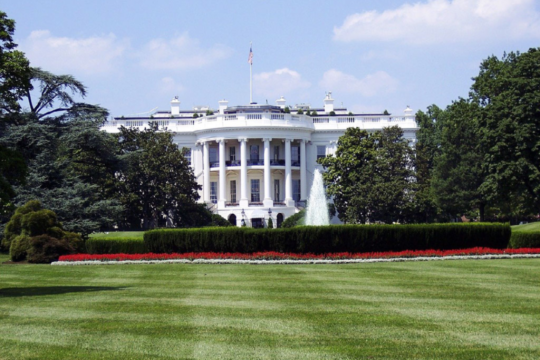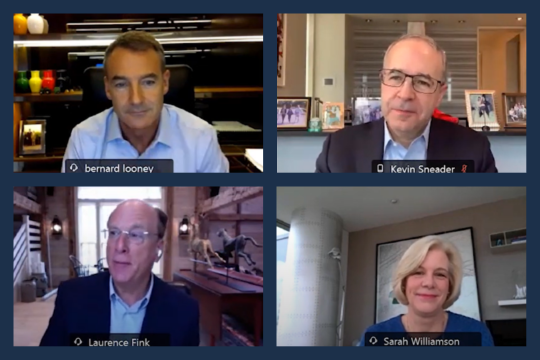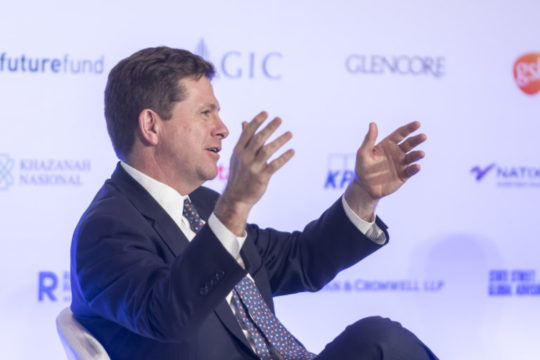
By Sarah Keohane Williamson, CEO

By Sarah Keohane Williamson, CEO
A change in the Oval Office offers a clean slate for the United States to set new examples to the world. In 2021, we will undoubtedly see a new US approach in many critical policy areas. Our financial markets exemplify and underpin US economic leadership globally, and the US can act to ensure that continued reliance on a market-driven financial system is seen as consistent with long-term sustainability.
A sound, future-oriented policy from the White House would enable the US to lead on reshaping capital markets to focus capital on the long term. The US can drive the world’s shift to more long-term, sustainable markets by leading global convergence on non-traditional corporate reporting, engaging with and shaping UN economic efforts, and creating a retirement savings system that builds wealth and financial inclusion.
Notable global organizations including the World Economic Forum, the Sustainable Accounting Standards Board, and the Task Force on Carbon-related Financial Disclosures have been working diligently to create new “non-traditional” disclosures for companies that are material and relevant to investors and financial markets. Likewise, the European Union is advancing its Non-Financial Reporting Directive, which includes disclosures that apply to listed and private companies and go beyond financial materiality to “double materiality.” MIFIDII and tech sector regulations show how EU rules determine behavior in global markets, particularly in the absence of a strong US presence.
US business leaders and investors are working to drive this global convergence on non-traditional metrics in a way that facilitates robust investment decisions. A new administration could provide leadership to jumpstart these efforts and ensure that the structure is supportive of a sustainable, market-driven economy. More broadly, naming a bipartisan National Commission on Long-term, Sustainable Competitiveness would address the issues that drive short-term behavior in markets, including the issues of quarterly guidance, buybacks, and current reporting and disclosures. Such a commission could allow the US to lead the global conversation and provide certainty for companies on these critical issues.
Green bonds have become a substantial market, and 48% of it is traded in Euros. While the US is a leader in public and private capital markets worldwide, we have let leadership in this space shift to the UK and Europe in recent years. To encourage markets to provide sustainable listed equity capital, private equity capital, venture capital, infrastructure and debt financing, the US can marshal resources and reengage in the global debate that is shaping capital markets today.
An immediate step in the right direction would be to have a significant American presence on economic and financial matters at the United Nations. There is global momentum around the UN Sustainable Development Goals, but they are rarely part of the conversation in the US. We have an opportunity to lead in moving capital to green technology and job-creating industries of the future, advancing net zero portfolios, and building new markets for carbon trading and sustainable securities. Having an empowered Ambassadorial US Representative to the UN Economic and Social Council would provide a focal point for American efforts to engage in this global shift.
Many countries in the world have sophisticated and modern pension and retirement savings systems; the US is not among them. Our system is governed by ERISA that was constructed in the 1970s, when most people spent their careers with a single employer, had defined benefit plans, and had little to no financial technology. Furthermore, the issue of wealth inequality is even more pronounced than the issue of income inequality, and our retirement savings system is a contributor to that inequality.
While updates have been made to ERISA over the years, legislation could set up a new retirement savings system alongside ERISA by building on the lessons learned from other countries over the last several decades. Individual-centered defined contribution plans can eliminate the burden on employers to administer such plans, ensure consumer choice and portability, and build in equity and financial inclusion. While a new retirement savings system would take years to have a significant impact on retirees, it would be a lasting, bipartisan legacy that a new administration could build for the long term.
To drive such an initiative, the White House could create a dedicated office to coordinate across the many groups involved in savings, investing, and pensions, with the ultimate goal of crafting a comprehensive retirement savings proposal that could allow future generations of Americans to have the resources necessary to retire comfortably and to make the US a leader in retirement systems globally.
At FCLTGlobal, our mission is to rebalance capital markets to support a long-term, sustainable economy. The new administration has an enormous opportunity for the US to act to ensure that our market-driven financial system leads the global shift to a more long-term, sustainable economy. To be sure, there are many critical issues to address in the short term, but there is no time like the present to focus on the long term as well.

Investor-Corporate Engagement | Article
23 November 2020 - Larry Fink, Bernard Looney, and Kevin Sneader discuss a global transition to more sustainable business models

Investor-Corporate Engagement, Metrics | Video, Article
23 June 2020 -

Investor-Corporate Engagement, Metrics | Article
22 July 2020 - Investors want standardized reporting of sustainability and other non-traditional metrics. What will that look like on a global scale?